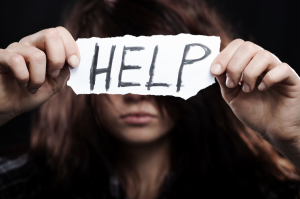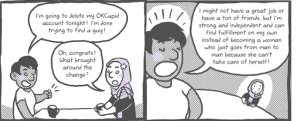Originally published on Adios Barbie and republished here with their permission.
It can happen to all of us.
Canceling plans for dinner with friends because the anxiety is too overwhelming. Feeling defeated when looking in the mirror at the gym. Or being overcome with remorse for enjoying that ice cream cone on last night’s date.
Starting the process of recovery from an eating disorder is a life-changing decision, but it’s not without challenges.
Sometimes, even when things are seemingly going great, an eating disorder can creep back into our lives and make us panic at the smallest reminder of old habits.
These stressors (sometimes referred to as “triggers”) are nasty little temptations that cause a recovering individual to lapse into old ways or make them feel compelled to do so without actually following through. And they vary by person and by situation.
One person may feel compelled to fall into a disordered pattern of eating when she is stressed, while another may do the same when he is bored.
While some stressors are more common than others, everyone faces different struggles.
The feeling of no longer being “in control” and the fear of losing my edge in swimming were some of my toughest battles, but knowing what my stressors were made it much easier for me to overcome them.
To find yours and cope with them in healthy ways so they won’t interfere with your recovery goals, try some of these tips that have really helped me.
1. Form a Support System
Recovering from an eating disorder isn’t something you have to do alone.
Everyone should have a support system to help work through and understand the recovery process. Support systems provide much-needed emotional support to help keep us motivated and positive in the face of challenges.
A therapist is a traditional support option you might consider, but it’s not the only one.
I’ve found that online communities and close friends are great sources of support, too, especially on a tight budget or without health insurance that covers the cost of a therapist.
2. Keep a Journal
A journal is a private place to work through thoughts and start to get a better handle on what your stressors actually are.
Being in recovery often encourages a person to get more in tune with how they respond to certain situations.
However, that greater sensitivity can sometimes cause conflicting thoughts about stressors, making it harder to pinpoint them.
Try using a journal to write down the details of each day, including all the highlights and low points. Before long, those things you’ve jotted down could make it possible to spot patterns and steer clear of situations that may be stressors.
A journal can also become a record of different coping strategies you’ve tried, so you can track how well each one worked, or it can act as an emotional release.
Taking the time to record your thoughts and feelings can be very therapeutic, and also serves as a reminder of your hard work and commitment.
If you’re not pumped about the old paper-and-pen method, try using one of these mobile apps. No matter what, just remember to journal consistently.
3. Find Healthy Distractions
When the urge to engage in disordered eating seems too great, that’s your cue to get involved in a healthy activity that doesn’t have anything to do with food or eating. That might mean taking your dog for a walk, reading a book, or playing guitar.
Whatever you decide, using distraction techniques can be a great way to avoid getting overwhelmed in the recovery process.
Overcoming eating disorder stressors is a mental and emotional battle as much as a physical one. If your mind is racing so much it’s luring you to give in to a stressor, ask a friend to join you during a therapeutic activity.
A listening ear, or just the physical presence of a pal, could help loosen the nagging pull of a stressor. You may also try one of my favorite tools, meditation, to clear your head and find inner peace.
4. Excuse Yourself from the Situation
In many cases when a person or setting is acting as your stressor, it’s in your best interest to control what you can to make things better. In other words, give yourself permission to leave the environment, creating space between yourself and what’s causing you anxiety.
Maybe your aunt just can’t stop talking about her juice cleansing diet during a family reunion, or the sight of heaping food trays at a holiday party is causing unnecessary stress.
In both these situations, and others like them, I’ve learned that it’s perfectly okay to step outside to get fresh air, or even decide it’s time to head home.
5. Practice Self-Care
Recovering from an eating disorder requires major changes, and it’s not a linear process.
During your attempt to change, you’ll likely encounter obstacles.
Even if you do succumb to a stressor, treat it as a learning experience, not a failure.
Feeling temporarily discouraged is understandable, but don’t give up. Practicing self-compassion can help alleviate the feelings of shame and inadequacy that often plague recovery.
***
Remember, even with the best intentions, nobody’s perfect. There are good days and there are bad days.
But through them all, be kind to yourself.
Any effort made to put your eating disorder in the past is a step of progress you have made. And that’s something to be very proud of.
No matter what, never forget that you are beautiful, strong, and tougher than anything life can throw at you – and, over time, even the biggest stressors will lose their influence.
[do_widget id=”text-101″]
Sarah Landrum is a freelance writer and blogger sharing advice on living a happy and healthy life. She is also the founder of Punched Clocks, a career development site dedicated to inspiring happy and successful careers. Follow her on Twitter @SarahLandrum, Google+, and LinkedIn.
Search our 3000+ articles!
Read our articles about:
Our online racial justice training
Used by hundreds of universities, non-profits, and businesses.
Click to learn more
Most Read Articles
- « Previous
- 1
- …
- 30
- 31
- 32




















